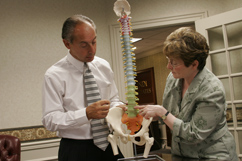Personal Injury FAQ
Most of our clients have never been involved in a lawsuit before. Therefore, they usually have many questions about how their case will be handled. Here are answers to some of the more common questions we get.
1. What is your fee?
2. Who pays for court costs or litigation expenses?
3. What is an example of some typical litigation expenses?
4. How do I know if I have a case?
5. What happens once a lawsuit is filed?
6. How do I keep up with the status of my case?
7. Are most cases settled out of court or do they go to trial?
8. How long will it take to finish my case?
9. Am I entitled to a copy of my medical records?
1. What is your fee?

Attorney Gismondi meets with new clients and answers their questions.
We do not typically charge people a retainer nor do we charge by the hour. Instead, we work on what is known as a contingent fee basis. That means our earning a fee is “contingent” on the result we obtain in the case. We will investigate your case at no cost and if we determine that you do not have good grounds for a lawsuit, you owe us nothing regardless of how much time and money we spent doing the investigation. If we take your case, and are successful in obtaining an award or settlement for you, then we earn a fee by sharing in a certain percentage of that recovery. The specific percentage that we earn depends on the type of case. If we do not succeed in getting an award or settlement for you, then we earn no fee at all in the case.
2. Who pays for court costs or litigation expenses?
Unlike some firms, we usually do not require clients to pay for costs or expenses out of their own pocket. Instead, the typical custom is for us to advance all of the costs associated with the case. If the case is successful, then we are reimbursed for the costs we have spent on your behalf. If the case is not successful, we do not ask you to reimburse us for those costs.
3. What is an example of some typical litigation expenses?
Litigation costs refer to expenses charged by somebody not connected with our law firm. For example, if we request your medical records from a doctor or a hospital, they usually charge a photocopying fee. Also, when we first start a lawsuit, the court charges a filing fee. If the case requires that we hire expert witnesses, those witnesses charge for their time on an hourly rate basis. In most cases, costs to expert witnesses account for the bulk of litigation expenses. However, total costs or expenses usually makes up a very small portion of the overall recovery in the case.
4. How do I know if I have a case?
You tell us your story, let us do some investigation, and then we will let you know whether you have enough evidence to file a lawsuit. How long it will take us to do the investigation depends on the type of case you have. For example, if it is an automobile accident, it usually does not take us very long to determine if you have a good case. On the other hand, if you contact us about a medical malpractice case, it is going to take longer to sort things out because we need to order the medical records, review them, and do appropriate medical research. Even with more complicated cases, however, we try to do the investigation as fast as we can so that you know where you stand.
5. What happens once a lawsuit is filed?

John Gismondi listens to a client’s story.
After a case is filed, the other side will hire an attorney who is given a certain period of time in order to answer our complaint. Once that answer is filed, the two sides to the lawsuit begin the longest phase in the case known as “discovery,” a legal term that simply means formal investigation. During this formal investigation stage, sworn testimony may be taken from witnesses through a procedure known as a deposition. A deposition is a question-and-answer session taken under oath. At some point during this formal investigation phase, it is likely that the lawyer on the other side will request the opportunity to take your deposition. In that event, we will make arrangements to meet with you ahead of time and prepare you for the questions that you may be asked at the deposition. In addition to depositions, this formal investigation phase may also involve each side exchanging other information.
Once the discovery or formal investigation phase is completed, your case would be put in line for a trial date. Of course, there will be other cases that are older than ours, which are “standing in line” ahead of us. Exactly how long it takes to get a trial date would be determined by how many other cases there are on the court’s docket. Generally speaking, we get several weeks advance notice of a trial date so that you have time to plan accordingly.
6. How do I keep up with the status of my case?
We like to keep our clients up-to-date with what is going on with their cases, but if you ever have any questions, the best thing to do is pick up the telephone and call us. If for some reason we are not available, just leave a message and we will return your call as soon as possible. We believe it is very important to return all client telephone calls and to do so promptly!
7. Are most cases settled out of court or do they go to trial?
The overwhelming majority of all cases are settled out of court. However, cases can settle at different points in time. For example, some cases may settle very early on, whereas other cases settle just before the trial is about to begin. We prepare every case as if we are going to court, even though we know that most cases will end up being settled. We adopt that philosophy because we never know exactly which cases will go to court, and furthermore because the harder we prepare your case, the better the settlement we are usually able to obtain.
8. How long will it take to finish my case?
That answer varies from case to case, but it is our policy at Gismondi & Associates to move cases along as quickly as we can. Unfortunately, these are sometimes things outside of our control, which influence how soon your case can be completed. Those include the complexity of the case, whether it can be settled out of court, and how much “backlog” there is in the court system. Despite all these variables, there are some cases we are able to conclude in a matter of months without going to court. Even for those cases, which end up going to court, we are usually able to bring them to a conclusion within approximately two years from the date the lawsuit is filed.

John Gismondi and Dawn Carson review a trial exhibit.
9. Am I entitled to a copy of my medical records?
Yes. Under the state law, every patient is entitled to receive a copy of his or her medical records, X-rays and test results upon request. The doctor or the hospital may charge you a photocopying f
ee, but they cannot deny you access to the records.
In order to get your records from a doctor, all you need to do is call the office and ask for a copy of your “office chart.” If you want to get the records from a hospital, call the Medical Records Department and make arrangements to come in and pick up your records.
We hope we have answered some of your basic questions. If you have other questions, or if you would like a free consultation about your possible case, please contact us at 412-281-2200 or toll free at 1-888-529-1255, or fill out our contact form and email it to us. Either way, our consultation and investigation of your possible case is free of charge.
The above is not legal advice. That can only come from a qualified attorney who is familiar with all the facts and circumstances of a particular, specific case and the relevant law. See our disclaimer.
